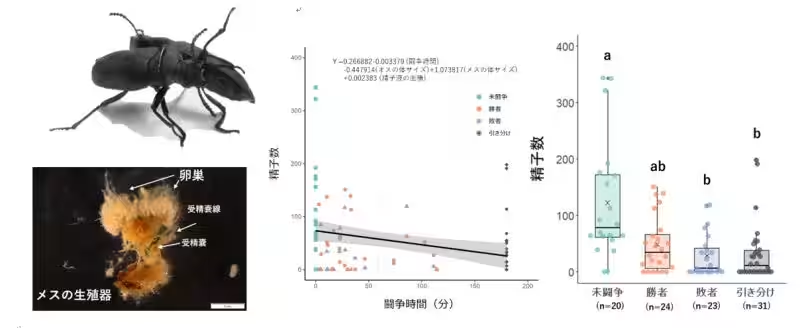

Surprising Findings on Insect Mating: Losers Have Fewer Sperm Transfers
Surprising Findings on Insect Mating Behavior
In a groundbreaking study conducted by researchers at Okayama University, a team has uncovered intriguing insights regarding the mating behavior of male giant mealworms, known scientifically as Zophobas atratus. Contrary to the long-standing belief that male insects increase sperm transfer following a loss in combat, this research reveals that defeated male mealworms struggle to effectively transfer sperm to females.
The Study and Its Significance
This study, published online in the Journal of Ethology, conducted by Teruhisa Matsuura, a doctoral student at Okayama University's Graduate School of Environmental and Life Science, and Professor Takahisa Miyatake, focused on the unique mating battles among these beetles, which often involve biting one another's legs. The researchers aimed to investigate the implications of these fights on reproductive success, particularly how the results of such conflicts influence sperm transfer capabilities.
The findings were unexpected. Previous research indicated that males typically compensated for losses in mating competitions by increasing the quantity of sperm provided to females. However, the team found that male mealworms that lost confrontations fail to deliver sperm effectively. This reversal of expectations highlights a complex interplay between physical condition, combat results, and reproductive success.
Key Observations
By conducting a series of experiments, Matsuura and Miyatake documented that not only do the defeated males carry fewer sperm for transfer, the length of their battles directly correlates with their reproductive capabilities. The data indicates that as combat duration extends, the quantity of sperm transferred diminishes further. Additionally, males of smaller body size displayed a greater potential for successful sperm transfer to females compared to their larger counterparts.
This remarkable finding is significant because it demonstrates, for the first time, the mechanics behind how the outcomes of physical confrontations among males impact their subsequent ability to reproduce. It challenges the widely held notion that failure in these fights always leads to compensatory behaviors in mating.
Broader Implications
The implications of this study extend beyond the giant mealworm. In the broader context of animal behavior and reproductive strategies, these results may suggest that the costs of fighting can drastically reshape mating dynamics across various species. While conflict is often viewed as a pathway to reproductive advantage, this research introduces questions about how defeat can inversely affect an individual’s success in passing on genes to future generations.
Matsuura commented on the novelty of their findings. He emphasized that while many species exhibit patterns where losers increase reproduction after fights, giant mealworms defy this pattern. This highlights the rich diversity of insect behavior and underlines the necessity for ongoing research into unexplored areas of animal ecology.
Conclusion
As the team continues to investigate the evolutionary implications of these behaviors, it opens a new frontier in understanding the complexities of reproductive strategies within the animal kingdom. The research not only provides insight into the giant mealworm but also raises significant questions about the nature of victory and defeat in the realm of mating among insects.
For more information, you can access the full study here.









Topics Other)










【About Using Articles】
You can freely use the title and article content by linking to the page where the article is posted.
※ Images cannot be used.
【About Links】
Links are free to use.